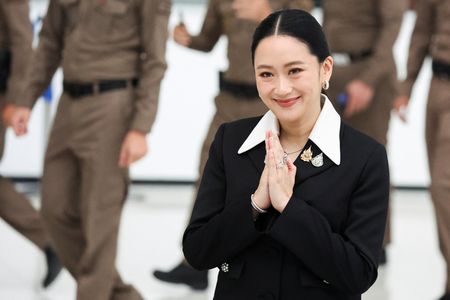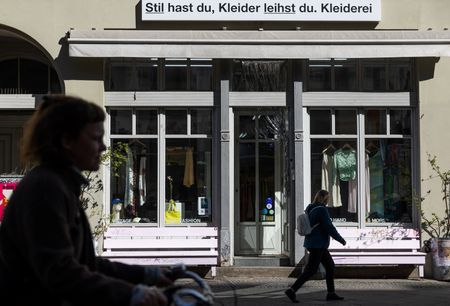By Devjyot Ghoshal and Panarat Thepgumpanat
BANGKOK (Reuters) -On July 1, less than an hour after a court suspended her from carrying out any duties as Thailand’s prime minister following a leaked phone call, Paetongtarn Shinawatra walked out of her Bangkok office and asked for forgiveness.
“I didn’t want anything for myself. I was only thinking about how to avoid fighting and avoid bloodshed,” she told reporters, referring to a call with former Cambodian leader Hun Sen that triggered a political firestorm and failed to avoid a deadly border conflict.
“I reaffirm that I truly intend to serve the nation. I have no ill intentions.”
On Friday, the Constitutional Court, which initially suspended her, dismissed 39-year-old Paetongtarn as premier, abruptly ending the term of Thailand’s youngest prime minister after just over a year in office.
Paetongtarn breached ethical norms by putting private interest ahead of national interest, and her actions damaged the reputation of the country and caused the public to lose confidence in the prime minister, the court said.
A political novice with no government experience, Paetongtarn took power last August after her predecessor, Srettha Thavisin, was expelled from office in a shock decision by the same court.
Her main qualification: being the daughter of former Prime Minister Thaksin Shinawatra, a polarising billionaire who has loomed over Thai politics for a quarter of a century.
With Paetongtarn’s unceremonious exit, six prime ministers either from the Shinawatra clan or appointed by the family have been pushed out of power by court decisions or military coups, underlining Thaksin’s decades-long tussle with the country’s conservative establishment.
Although popular at the start of her term, with a 31.35% of respondents nationwide backing her as the leading prime ministerial choice in September 2024, Paetongtarn’s standing nosedived to 9.2% by June, according to the National Institute of Development Administration’s surveys.
In the end, however, her undoing turned out to be the leaked audio of a call with Hun Sen in June, where she appeared to be subservient to the veteran Cambodian politician and criticised a popular Thai general, immediately drawing a public backlash.
A petition filed to the Constitutional Court by 36 senators accused Paetongtarn of dishonesty and breaching ethical standards, leading initially to her suspension and eventually, her dismissal from office.
Paetongtarn publicly apologised over the leaked call even before she was suspended from office, insisting she had intended to de-escalate a territorial row between Thailand and Cambodia.
A tense troop buildup along the frontier ultimately led to a five-day conflict in late July involving fighter jets and artillery barrages, the worst fighting between the neighbours in over a decade.
ANOTHER SHINAWATRA OUSTED
By her own admission, Paetongtarn spent a childhood steeped in her father’s meteoric rise from entering politics in 1994 to becoming prime minister only seven years later – and reshaping Thailand’s political system with an enduring brand of populism.
She attended Chulalongkorn University in Bangkok and Britain’s University of Surrey, and then got involved in the Shinawatra family’s businesses, before entering politics in 2023 to lead the Thaksin-backed Pheu Thai party.
On the campaign trail, a heavily-pregnant Paetongtarn evoked the nostalgia of previous Shinawatra-led administrations and promises of big-ticket reforms to woo millions of working class voters.
Pheu Thai only finished second in the polls but, after the election-winning Move Forward party was stymied from taking power, Thaksin’s political machine manoeuvred to secure a parliamentary majority to form a government.
That allowed Srettha to become prime minister, followed by Paetongtarn, who failed to deliver on her party’s big electoral promises, including firing up a sluggish economy and completing a flagship handout programme that has now been put on ice.
Southeast Asia’s second largest economy now faces another period of political turmoil, and the next prime minister could come from the Pheu Thai, a member of its ruling coalition, or even the opposition if they can combine and trigger a few defections.
Soon after she took office last, Paetongtarn’s administration exuded optimism, announcing in a press release last September: “We want to work for a complete three years to ensure continuity.”
It was not to be, and Thailand’s Venetian Gothic style Government House will soon have its third prime minister in two years.
(Reporting by Devjyot Ghoshal and Panarat Thepgumpanat; Additional reporting by Panu Wongcha-um; Editing by Raju Gopalakrishnan)











